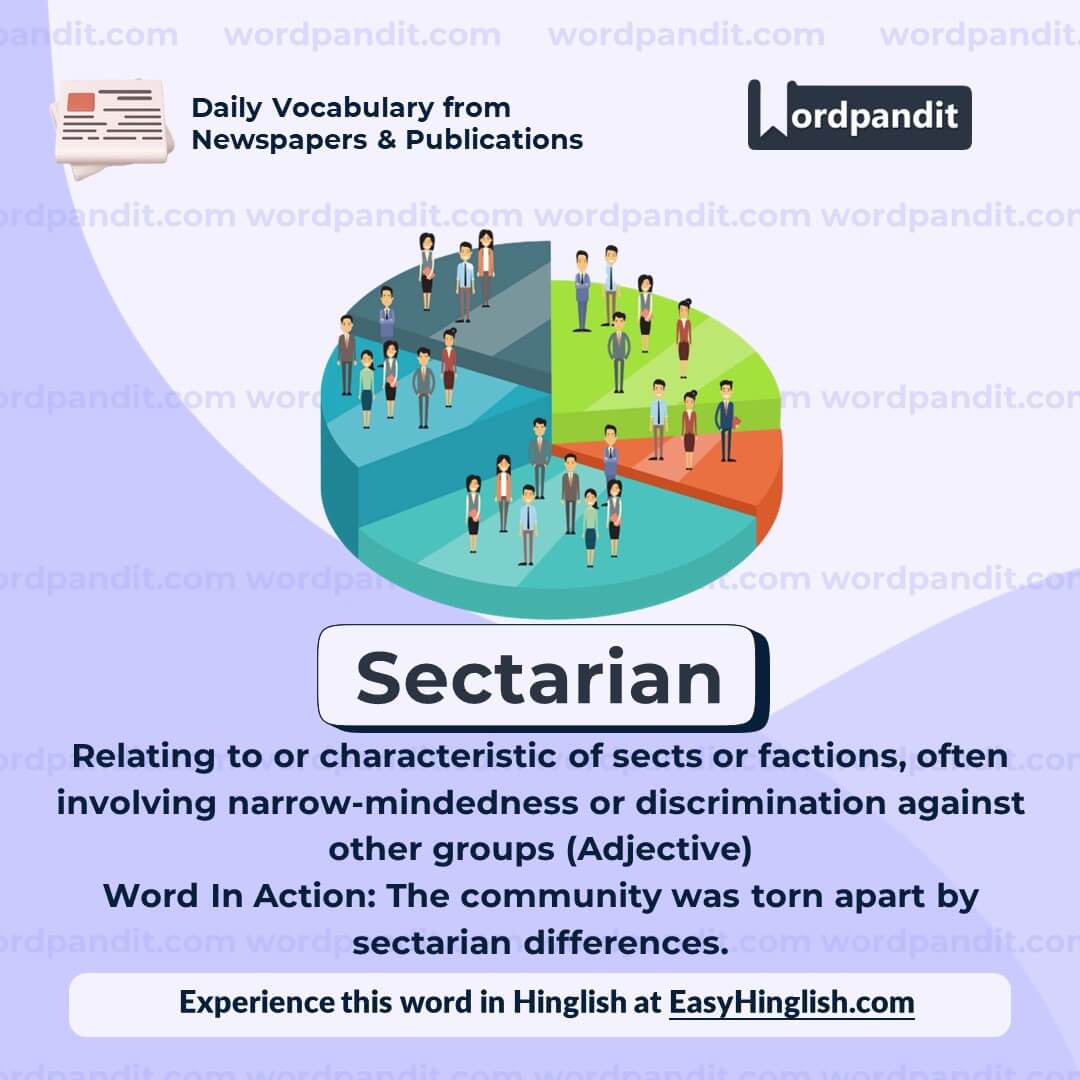Daily Vocabulary from Indian Newspapers and Publications
Welcome to Wordpandit’s Indian Vocabulary Hub
At Wordpandit, we understand the importance of staying rooted in the local context while expanding your language skills. This section focuses on enriching your vocabulary with words and phrases drawn from India’s leading newspapers and publications, ensuring you're learning vocabulary that is practical, relevant, and uniquely Indian.
Why Indian Sources Matter
We believe that the best way to master any language is by immersing yourself in local content. That’s why we carefully curate vocabulary from top Indian publications, including:
- The Hindu
- The Times of India
- The Economic Times
- Hindustan Times
- Live Mint
- The Indian Express
- And many others...
Stay Updated, Stay Relevant
With daily updates from Indian news sources, you’ll be consistently learning words that reflect the trends and shifts in Indian society and culture. Our focus is to provide vocabulary that enhances your understanding of the language in an Indian context.
How Wordpandit Supports Your Goals
Whether you’re preparing for exams, aiming to improve your professional communication, or simply want to stay connected with the latest Indian vocabulary, Wordpandit is here to guide you every step of the way.
Learn with a Practical Approach
Our interactive learning methodology includes real-world examples, engaging activities, and context-specific usage to ensure that every word becomes part of your active vocabulary.
Dive into Indian Vocabulary Today!
Why Choose Wordpandit?
Practical Learning: Focus on words you'll actually encounter in real-world reading, enhancing your comprehension and communication skills.
Diverse Content: From current affairs to scientific breakthroughs, our varied sources expose you to vocabulary across multiple domains.
Effortless Integration: Make Wordpandit a part of your daily routine. Just a few minutes each day can significantly boost your lexicon over time.
Your Path to Vocabulary Mastery
- Visit our Daily Vocabulary section regularly
- Explore new words and their usage in context
- Practice incorporating these words into your own writing and speech
- Track your progress as your vocabulary expands
Start Your Journey Today
Embark on your vocabulary enhancement journey with Wordpandit. By consistently engaging with our daily posts, you'll build a robust vocabulary that serves you well in academic, professional, and personal contexts.
Remember, a word a day keeps linguistic limitations at bay. Make Wordpandit your daily companion in the quest for vocabulary excellence!
WORD-1: Inelegant
Context:
"It finds itself in an inelegant ideological cul-de-sac. After the spectacle of Sambhal and the 'discovery' of a Hindu place of worship beneath Ajmer’s most famous dargah, this self-styled guardian of the Hindus and the Hindu Samaj seems trapped in a treacherous bhul-bhulaiya or maze of its own making." - The Wire
Explanatory Paragraph:
The word "inelegant" describes something that lacks grace, refinement, or sophistication, either in appearance, behavior, or thought. In the context above, it conveys a lack of thoughtfulness or finesse in handling an ideological or strategic situation, resulting in a clumsy or awkward outcome.
Meaning: Lacking grace, refinement, or sophistication; awkward or clumsy (Adjective)
Pronunciation: in-EL-uh-guhnt
Difficulty Level: ⭐⭐ (Beginner/Intermediate)
Etymology: Derived from the Latin word "inelegans," meaning "not elegant," formed from "in-" (not) and "elegans" (elegant, tasteful).
Synonyms & Antonyms:
Synonyms: awkward, clumsy, crude, unrefined, ungainly
Antonyms: elegant, refined, sophisticated, polished, graceful
Usage Examples:
- The presentation was criticized for its inelegant layout, which distracted from the main message.
- Her response to the question was inelegant, filled with pauses and contradictory statements.
- The design of the new bridge is functional but inelegant, lacking any aesthetic appeal.
- The policy's implementation was marked by inelegant communication, confusing both employees and stakeholders.
Cultural Reference:
In mathematics, an "inelegant" solution is one that achieves the correct result but in a convoluted, overly complex, or inefficient manner, as opposed to an elegant solution which is simpler and more intuitive.
Think About It:
Can something that is functional and practical still be considered inelegant? Why is elegance often associated with simplicity and efficiency?
Quick Activity:
Identify a design, sentence, or solution that you find inelegant. Rewrite or redesign it to make it more elegant and share the before-and-after examples.
Memory Tip:
Remember "inelegant" by breaking it into "in" (not) and "elegant" (graceful). So, "inelegant" is simply "not elegant."
Real-World Application:
The term "inelegant" is often used in professional settings to critique poor design, awkward phrasing in writing, or ineffective strategies. Recognizing and avoiding inelegance can significantly improve communication and problem-solving outcomes.
WORD-2: Precipitated
Context:
"As a soldier in the Foreign Legion, he participated in the Dien Bien Phu battle, a military defeat that precipitated France’s departure from Vietnam." - The Wire
Explanatory Paragraph:
The word "precipitated" refers to causing something to happen suddenly or quickly, often before expected or desired. In the context provided, it highlights how the military defeat at Dien Bien Phu directly triggered or accelerated France’s decision to leave Vietnam.
Meaning: To cause an event or situation to happen suddenly or prematurely (Verb)
Pronunciation: pri-SIP-uh-tay-ted
Difficulty Level: ⭐⭐⭐ (Intermediate)
Etymology: From the Latin word "praecipitare," meaning "to throw headlong or hasten," which stems from "prae" (before) and "caput" (head).
Synonyms & Antonyms:
Synonyms: hastened, triggered, provoked, accelerated, instigated
Antonyms: delayed, hindered, slowed, postponed, prevented
Usage Examples:
- The sudden rise in oil prices precipitated a global economic crisis.
- His careless remarks precipitated an argument that could have been avoided.
- The lack of proper maintenance precipitated the collapse of the old bridge.
- The CEO’s resignation precipitated a chain of changes in the company’s leadership.
Cultural Reference:
The term "precipitated" is often used in historical analysis, such as "the assassination of Archduke Franz Ferdinand precipitated World War I." It reflects the direct cause-effect relationship that brings about significant events.
Think About It:
Can small events or actions precipitate major changes in history or personal life? Think of examples where a seemingly minor incident led to a significant outcome.
Quick Activity:
Write a short paragraph about a historical event or personal situation that was precipitated by a specific action or decision. Highlight the cause-effect relationship.
Memory Tip:
Think of "precipitated" as something "pushed forward suddenly," like a rock being thrown off a cliff ("pre-" means "before," and "-cipitated" relates to "headlong motion").
Real-World Application:
The word "precipitated" is frequently used in discussions about crises, accidents, or pivotal events in history, politics, and even science. For instance, in chemistry, it refers to a substance separating from a solution suddenly.
WORD-3: Imprimatur
Context:
"The Babri Masjid in Ayodhya has been demolished, and in its place, a grand Ram temple has been constructed – with the imprimatur of the Supreme Court." - The Wire
Explanatory Paragraph:
The word "imprimatur" refers to an official approval, endorsement, or authorization of something. Historically, it was used in the context of a license given by the Catholic Church to print a book. In the context above, it means that the Supreme Court gave its official approval or sanction for the construction of the Ram temple.
Meaning: An official approval or authorization, especially for a course of action (Noun)
Pronunciation: im-prih-MAH-tur
Difficulty Level: ⭐⭐⭐⭐ (Advanced)
Etymology: Derived from the Latin word "imprimere," meaning "to press" or "to imprint." The term was first used in the early 17th century in reference to an official license to publish books.
Synonyms & Antonyms:
Synonyms: approval, endorsement, sanction, authorization, consent
Antonyms: disapproval, prohibition, rejection, denial, veto
Usage Examples:
- The project will not move forward without the imprimatur of the city council.
- The new textbook was published with the imprimatur of the Ministry of Education.
- The CEO’s imprimatur on the new policy boosted employee confidence in the company’s direction.
- Without the imprimatur of the board, the initiative could not gain traction.
Cultural Reference:
In the history of publishing, particularly during the time of the Catholic Church’s control over printed material, the word "imprimatur" referred to a formal approval stamped on a book or document, signifying it was deemed free of heresy or inappropriate content.
Think About It:
Why is it important for major decisions or projects to have an imprimatur from an authoritative body? Does it always guarantee public acceptance or success?
Quick Activity:
Think of a situation in history, politics, or daily life where having an imprimatur was crucial for success. Write a brief explanation of the situation and how the approval impacted the outcome.
Memory Tip:
Remember "imprimatur" by associating it with "imprint" — think of it as a stamp of approval or authorization imprinted on a document or idea.
Real-World Application:
"Imprimatur" is often used in legal and governmental contexts, where formal approval is required before decisions or actions can be implemented. It is also used metaphorically in academic and professional settings to denote credibility or backing from an authoritative source.
WORD-4: Sectarian
Context:
"From the prime minister to the chief minister of Uttar Pradesh, BJP leaders stoke this sectarian cauldron with slogans like 'batenge to katenge'." - The Wire
Explanatory Paragraph:
The word "sectarian" refers to actions, attitudes, or conflicts that arise from strong loyalty or devotion to a particular religious, political, or social group, often accompanied by prejudice or hostility toward others. In the context provided, it implies that divisive rhetoric is being used to fuel tension based on religious or ideological lines.
Meaning: Relating to or characteristic of sects or factions, often involving narrow-mindedness or discrimination against other groups (Adjective)
Pronunciation: sek-TEHR-ee-uhn
Difficulty Level: ⭐⭐⭐⭐ (Advanced)
Etymology: Derived from the Latin word "secta," meaning "school of thought" or "sect," combined with the suffix "-arian," indicating relatedness or belonging.
Synonyms & Antonyms:
Synonyms: factional, divisive, partisan, bigoted, exclusive
Antonyms: inclusive, tolerant, nonpartisan, broad-minded, unifying
Usage Examples:
- The conflict escalated due to sectarian divisions within the community.
- Her speech was criticized for its sectarian tone, which alienated many listeners.
- The government worked to implement policies that would reduce sectarian tensions in the region.
- Sectarian violence between the two groups led to widespread destruction and loss of life.
Cultural Reference:
Sectarianism has played a significant role in historical conflicts, such as The Troubles in Northern Ireland, where divisions between Catholics and Protestants led to decades of violence and political unrest.
Think About It:
Why do sectarian divisions persist in modern societies, and what can be done to promote harmony and inclusivity across diverse groups?
Quick Activity:
Think of an example of a conflict or event in history or current events that involved sectarian divisions. Write a short summary explaining how these divisions affected the outcome.
Memory Tip:
Think of "sectarian" as stemming from "sect," meaning a group. It refers to behaviors or attitudes favoring one group while excluding or opposing others.
Real-World Application:
The term "sectarian" is often used in discussions about social, political, and religious conflicts. Understanding and addressing sectarianism is crucial in conflict resolution, diplomacy, and fostering inclusive communities.
WORD-5: Terse
Context:
Explanatory Paragraph:
Synonyms & Antonyms:
Usage Examples:
- The manager's terse email left the team wondering if something was wrong.
- Her terse reply to his apology made it clear she was still upset.
- The instructions were terse but effective, providing just the necessary details.
- The teacher's terse comments on the essay highlighted its flaws without much elaboration.
Cultural Reference:
Think About It:
Quick Activity:
Memory Tip:
Real-World Application:

















